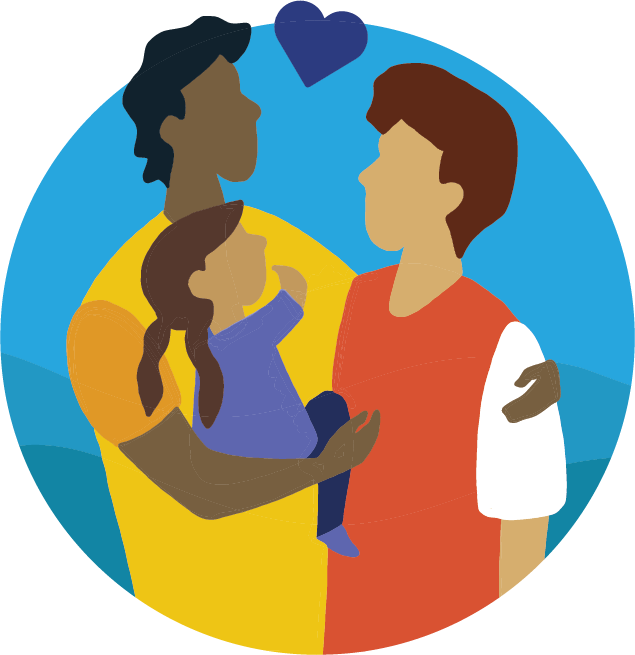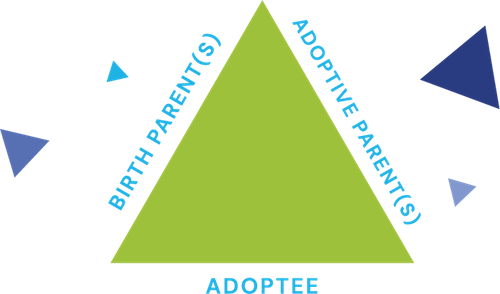About Evermore
Our Resources
Our team
Our History
Our Mission
Supporting permanency and empowering families through education, programs and services.
Our Vision
Offering quality programs and services so that every child can flourish in a forever family.
Our Values
Integrity
Building relationships on trust, honesty and consideration of other people’s well-being.
Compassion
Considering the generations of history that have impacted children and families today.
Collaboration
Creating mutually beneficial relationships with partners that have common goals benefitting individuals, children and families.
Inclusiveness
Providing a safe and open environment for everyone that is seeking our services with a commitment diversity and inclusion.
Respect
Practicing in ways that regard differences in feelings, rights or traditions of others and being present and holding space for others when communicating.
Accountability
Being accountable for our decisions and actions in all that we do to ourselves, others and our stakeholders.
What We Do
We offer comprehensive support and education services for everyone touched by permanency. Whether you're a birth parent exploring options, a prospective parent looking into adoption, an adoptee seeking reunion or support, or parents or caregivers whose families are created through permanency and need support, educational tools, or just an ear, we're here to help.


What Drives Us
We believe that education about adoption and permanency is important to the success of adoptive and permanent families. Knowledge about current practices in adoption dispels myths and helps families and our larger community understand the process and impact of adoption today.
When any form of permanency, including adoption, becomes the plan for a child we believe the child's best interests are met when families are well-equipped with a broad understanding of the issues that may arise along the journey. Knowing what resources are available to support the child throughout his or her life within a permanent family is essential from the start.
What is Permanency and Why is it Important?
Permanency is an expansive term, with many important factors. The definition of permanency includes adoption, legal guardianship and kinship care. The Evermore Centre supports all forms of permanency. A Permanent connection with at least one committed adult who provides a safe, stable, and secure parenting relationship, unconditional commitment and lifelong love and support is crucial for every child. We emphasize the importance of cultural competency in any permanency relationship.
We emphasize the importance of cultural competency in any permanency relationship, and by choosing a more inclusive name, we aim to step in the direction of reconciliation and deeper partnership with Indigenous communities. We recognize that Canada’s colonial legacy has negatively impacted many families, and with this name change, we aim to reflect cultural humility and a commitment towards healing.
We are happy to share that we have changed our name to “The Evermore Centre”. The word “evermore” is a synonym for “forever, always”, and it reflects our organization’s focus on fostering permanent homes that create well being & long term stability for children.

Our Resources
Our extensive range of resources provides those with a connection to adoption, legal guardianship, Person of Sufficient Interest (PSI), and kinship care with appropriate information for their specific needs, support in their process through the Domestic Adoption Orientation Program, The Evermore Centre support groups, the The Evermore Centre Library, our mentoring program and much more.
Carol Bothwell Library
The Evermore Centre is home to the The Evermore Centre Carol Bothwell Library, an extensive Resource Centre which houses one of the largest adoption-related libraries in Canada. It offers information on all aspects of adoption and permanency-related topics for adults, children, professionals and students. The Carol Bothwell Library is a substantial resource for Saskatchewan Polytechnic, University of Saskatchewan and the University of Regina students working on projects or bachelor and masters programs. An The Evermore Centre membership to the library allows for members to borrow books which are then mailed via Canada Post with all postage paid including book returns. Learn more about our library.
Conferences, Workshops & Webinars
We host and facilitate a number of adoption and permanency-related events. These events provide training and information on relevant, current topics of interest to the wider community of permanent families. Past conferences have brought renowned experts such as Cindy Blackstock, Deborah Gray, Patricia Irwin Johnston and Dr. Denise Goodman to Saskatchewan. See what's coming up in our calendar!
Domestic Adoption Orientation Program
The Evermore Centre offers a domestic adoption, pre-adoption preparation program called the Domestic Adoption Orientation Program (DAO). This program is mandated by the Ministry of Social Services as a pre-application requirement for individuals or couples who are interested in adopting a child/children who is/are in the care of the Ministry of Social Services. All individuals who want to adopt domestically are required to participate in the DAO prior to being formally referred to the Ministry of Social Services to proceed with their Domestic Adoption Application. Learn more about the DAO Program.
Our Team

Denise Mildner, BBA, MBA
Executive Director
View Bio
Denise graduated from York University with a BBA and MBA and brings a wealth of management and governance experience from previous leadership roles. She is a solutions-oriented professional who is the Evermore Centre’s overall leader. She is the executer of the strategic plan and in charge of daily operations, providing guidance and direction to staff, and reports to the board.

Candy Hamre Wyka
Programs & Communication Coordinator
View Bio
This position is responsible for management of our website, developing and overlooking our social media platforms, general communications, and assisting with programming.

Lorelei Neubauer, BISW
Family Development Coordinator
View Bio
Lorelei takes an active role in helping The Evermore Centre families by providing support and education through the DAO program, workshops, and other program opportunities. She also co-facilitates the PRIDE Review Sessions with families currently in the adoption process.

Nicole Woods, BSW
Administration
View Bio
Nicole responds to general inquires and questions, being the first face of the organization and other client services duties. She is also responsible for the database and organization of the Domestic Adoption Orientations (DAOs) and memberships.

Samantha Cree
Indigenous Resource Representative
View Bio
Samantha offers cultural guidance to both staff and families. She is in charge of developing cultural activities, expanding the Indigenous section of the Library, and acting as a liaison with the Indigenous community.

Darlene Slorstad
Child & Family Therapist
View Bio
The passion Darlene has held with parenting her own three children begun a lifelong journey and 24-year career as a Behavioural Therapist. Darlene has worked in community schools and as a clinician supporting children and their parents/caregivers. Now in semi-retirement, Darlene is facilitating the Circle of Security Parenting Program. She continues her desire to support children, their families, and other significant caregivers.
Our Board
Robert Belley
President
Michele Hengen
Vice President
Evan Sawatzky
Treasurer
Brittney Landstrom
Secretary
Kim Gilbert
Director
Joanne Morgan
Director

Why the triangles?
In the world of adoption the triangle (sometimes a triangle intertwined with a heart) and sometimes a circle, has traditionally been used as a symbol that represents the adoption journey and the key relationships within it. It does not encompass every aspect of the journey but it does highlight three of the key people involved - the adoptee, the birth parent(s), and the adoptive parent(s). Each side of the triangle represents the relationship between those key person(s). The triangle displays the interconnectedness and interdependence within adoption.
